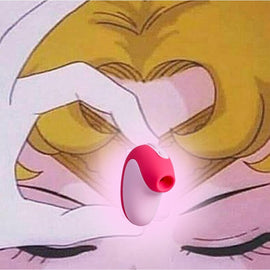Arousal Nonconcordance: Shout It from the Mountaintops

I’d like to pay someone to fly around with one of those advertising banners, only all it would say is “arousal nonconcordance!” and I’d hope that people would be curious enough to search google.
The number of times that I have excitedly begun to explain the concept of arousal nonconcordance to friends, family members, strangers in cafes, students, customers, people I’m on a first date with, people I meet on tinder but don’t intend to date, basically every time I get the opportunity, is more than I can count and it’s still not enough.
Arousal Nonconcordance is a fairly straightforward concept, but one that flies in the face of many things we’re taught: that sometimes, we’re physically aroused while not being mentally aroused, and other times we’re mentally aroused without being physically aroused.
It sounds simple, but many of the myths and legends of sexuality can be traced back to a lack of understanding or even sheer denial of the phenomena. A few: “you’re wet, so you must want sex.” “I was sexually assaulted but I had an orgasm. Does that mean I actually wanted it to happen?” “If she’s dry, she’s lying about being into it.”
Many of these myths center around the sexual experiences of people with vulvas. I’ll say “women” for brevity here, but this really does affect people of a variety of gender and bodily experiences, including trans and intersex people. Because of how women are socialized and a variety of other factors, they are more likely to be nonconcordant, especially in the case of being physically aroused without being mentally aroused. This causes many misunderstandings.
I’ve found, personally as well as in my profession writing about sexuality and previously, working in adult retail, that an understanding of arousal nonconcordance can be liberating. Understanding that not only is this kind of “discrepancy” real, it’s common, can bring healing to every person who’s been told that they wanted something when they didn’t and felt betrayed by their body.
Statistically, men have about a 50% overlap in feelings of mental and physical arousal, while women have about 10% overlap: only ten percent of the time will a woman feel both mentally and physically aroused by whatever stimulus is presented. This is because the way “female” sexual response is set up, there will be genital response to almost anything sexually relevant even if the person doesn’t themselves find it arousing.
This is why sometimes we feel physical arousal in response to stimuli that we really disagree with as being arousing mentally. I’m sure most any person can think of a time when they were embarrassed or even disturbed by something they reacted to with genital arousal, and I’m here to tell you that unless you mentally agree that something is arousing, it’s not.
According to some research, women will have an arousal response to almost anything sexually relevant, even if it isn’t something they’re turned on by. Men, on the other hand, usually only respond with arousal to stimuli that they’re sexually interested in. In one study, men only had genital arousal to videos they were sexually interested in, either men or women having sex with men. But women had a genital response to everything that was sexually relevant, regardless of the video they were watching, whether that was men having sex with men, women having sex with women, or baboons having sex. In the same vein, some women have reported experiencing the physical response of orgasm while not mentally registering: the muscles are working and responding, but she doesn’t feel it. This is why assertions that “she was wet, so she was obviously into it” or “she orgasmed so it must have been good” just don’t have any scientific backup.
That strong cultural myth that “if you’re wet, you must be turned on!” invalidates the fact that it doesn’t arouse the person mentally and can even make them question their internal voice, which tells them they aren’t turned on. This can lead to feelings of insecurity, and can result in some giving in to advances that they aren’t actually interested in or comfortable with: a phenomena that puts fault squarely with the person pressuring them and society, not their body or nonconcordant arousal.
While the concept of arousal nonconcordance is something I view as incredibly important for any person equipped with a vulva, I think that our penis-having counterparts have a responsibility to know about and understand it. Understanding arousal can help unlock a better understanding of how arousal itself works, which leads to a better experience for everyone involved. So many misconceptions of how sexual pleasure works can be linked back to this one concept; it’s something worth endless discourse and consideration. In the meantime, I’ll be working on a poster about it to wheatpaste throughout my city.
Caitlin is a non-binary queer femme traveling the world, writing, and trying to counteract the negative effects of shame, both personally and on a wider social level. They like keeping to themselves, nature, and weird trivia. You can find their work all over the internet. If you’d like clarification on any of these topics or have other questions about sexuality, always feel free to contact them on their personal website!

Latest Articles

A Hot and Quick Guide to BV, UTIs, and Yeast Infections

9 Acts of Queer Resistance to Know in Addition to the Stonewall Riots








